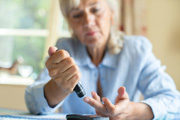NICE advocates wider use of artificial pancreas technology if NHS can get a better price

People who are struggling to manage their type 1 diabetes could be offered the latest artificial pancreas technology under draft guidance from NICE – but only if a lower price can be agreed.
The recommendations would also apply to patients with type 1 diabetes who are pregnant or planning a pregnancy after the committee found hybrid closed loop systems were more effective than standing care at keeping blood glucose levels within a healthy range.
But the recommendations will depend on the technology companies and NHS England agreeing a cost-effective price, NICE said in the recommendations now out for consultation.
It is estimated that around 105,000 people in England and Wales could be offered the technology under the proposals should they go ahead.
The committee concluded that hybrid closed loop systems should be recommended as an option in people with type 1 diabetes who are having difficulty managing their condition and have an average HbA1c of around 64 mmol/mol (8.0%) or more.
But they must also already have optimal management with at least one of continuous subcutaneous insulin infusion, real-time continuous glucose monitoring or intermittently scanned continuous glucose monitoring, NICE said.
Use of the technology can reduce the mental load for people with the condition (or their families or carers) and improve quality of life, the committee found.
They also recommended their use in pregnancy because blood glucose levels are harder to manage.
At present an average annual cost for the technology is £5,744, which is higher than what NICE considers a cost-effective use of NHS resources.
Mark Chapman, interim director of medical technology at NICE, said: ‘Some people living with type 1 diabetes struggle to manage their condition, even though they are doing everything asked of them by their diabetes team. This technology is the best intervention to help them control their diabetes, barring a cure.
‘At a time when the number of people with diabetes is rising, we have to focus on what matters most to people who use NHS services by balancing recommending the best care with value for money.’
Professor Partha Kar, national specialty advisor for diabetes at NHS England, said: ‘This technology has been proven to give the best control for managing type 1 diabetes and should make things like amputations, blindness, and kidney problems possibly a thing of the past.
‘We have seen fantastic results from the real-world trials which have taken place and thank you to NICE for their review of the evidence and subsequent conclusions. The quality of life this technology gives to those using it is huge.
‘We look forward to working with industry colleagues to help ensure this technology can be made available to those who need it.’
Pulse October survey
Take our July 2025 survey to potentially win £1.000 worth of tokens

Visit Pulse Reference for details on 140 symptoms, including easily searchable symptoms and categories, offering you a free platform to check symptoms and receive potential diagnoses during consultations.









